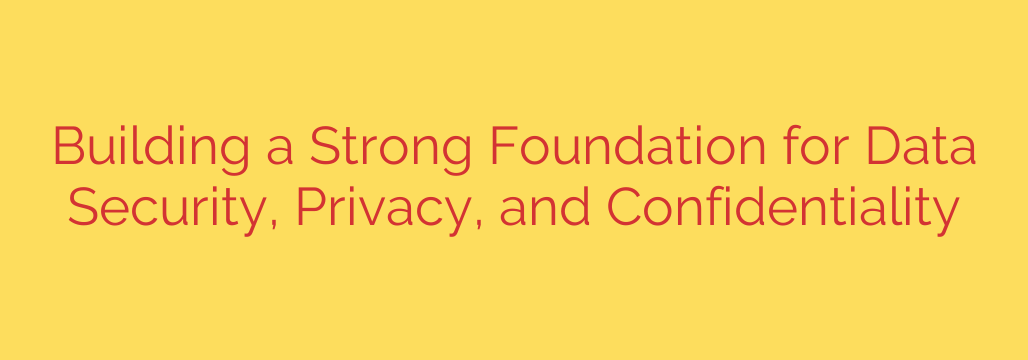
Data Security vs. Privacy vs. Confidentiality: Building Your Digital Fortress
In today’s digital economy, data is one of the most valuable assets a business can possess. From customer information to proprietary trade secrets, the information you collect and manage is critical to your operations. However, with this value comes immense responsibility. A single data breach can lead to devastating financial losses, regulatory fines, and irreparable damage to your reputation.
To effectively protect your organization, it’s crucial to understand the three core pillars of data protection: security, privacy, and confidentiality. While often used interchangeably, these are distinct concepts that work together to create a comprehensive defense strategy. Understanding the difference is the first step toward building a true digital fortress.
What is Data Security? The “How” of Protection
Think of data security as the walls, locks, and guards of your fortress. It encompasses the technical and physical measures you implement to protect your data from unauthorized access, use, disclosure, alteration, or destruction. It is the practical foundation upon which privacy and confidentiality are built.
Data security refers to the protective measures put in place to prevent unauthorized access to data. These measures are designed to safeguard the integrity and availability of your information systems.
Key components of data security include:
- Access Controls: Implementing user authentication, passwords, and permissions to ensure only authorized personnel can access specific data.
- Encryption: Scrambling data both in transit (as it moves across networks) and at rest (when it’s stored on servers or drives) so it’s unreadable without a decryption key.
- Network Security: Using firewalls, intrusion detection systems, and antivirus software to protect your network from external threats like malware and hackers.
- Physical Security: Securing servers, computers, and other hardware in locked rooms or data centers to prevent physical theft or damage.
Without strong data security, any promises of privacy or confidentiality are ultimately empty.
What is Data Privacy? The “Who” and “What” of Data Handling
If security is the wall, data privacy is the set of rules governing who is allowed inside and what they are permitted to do. Privacy is fundamentally about individual rights and control over personal information. It is defined by legal and ethical obligations regarding the collection, processing, storage, and sharing of personally identifiable information (PII).
Data privacy focuses on an individual’s rights to control how their personal information is collected, used, and shared. This is largely driven by regulations that dictate how businesses must handle consumer data.
Key principles of data privacy include:
- Consent: Ensuring individuals have given clear, informed consent for their data to be collected and used for specific purposes.
- Purpose Limitation: Collecting only the data that is necessary for a stated purpose and not using it for other reasons without further consent.
- Individual Rights: Upholding an individual’s right to access, correct, or delete their personal data upon request.
- Compliance: Adhering to legal frameworks like the General Data Protection Regulation (GDPR) in Europe or the California Consumer Privacy Act (CCPA).
A company can have excellent security but poor privacy practices if it collects more data than necessary or uses it in ways customers did not agree to.
What is Data Confidentiality? The “Promise” of Secrecy
Confidentiality is the most specific of the three concepts. It is an agreement or promise to protect sensitive information from being disclosed to unauthorized parties. While privacy often applies to personal data of individuals, confidentiality can apply to any type of sensitive data, including corporate, government, or client information.
Data confidentiality is an agreement to limit access and prevent the disclosure of sensitive information to unauthorized individuals. This is about ensuring that data shared in confidence remains a secret.
Examples where confidentiality is critical include:
- Healthcare: Patient records are protected by confidentiality agreements under laws like HIPAA.
- Legal Sector: Attorney-client privilege ensures communications remain confidential.
- Business: Non-disclosure agreements (NDAs) protect trade secrets, financial data, and strategic plans from being leaked to competitors.
Confidentiality is upheld through security measures like access controls and encryption, but its foundation is an explicit or implicit promise of secrecy.
Actionable Steps to Build Your Data Protection Framework
Understanding these concepts is the first step. Implementing a robust strategy is the next. Here are key actions your business should take to build a strong foundation for data protection.
Conduct a Comprehensive Data Audit. You cannot protect what you don’t know you have. Identify all the sensitive data you collect, where it is stored, and who has access to it. This includes customer PII, employee records, and proprietary business information.
Implement the Principle of Least Privilege (PoLP). This is a cornerstone of both security and confidentiality. Ensure that employees only have access to the specific data and systems they absolutely need to perform their job duties. This minimizes the potential impact of a compromised account.
Encrypt All Sensitive Data. Data should be encrypted both at rest (on servers and hard drives) and in transit (over the internet or internal networks). Encryption is one of the most effective technical safeguards against a data breach.
Develop and Enforce Clear Policies. Create formal, written policies for data handling, privacy, and incident response. Your privacy policy should be transparent and easily accessible to customers, explaining what data you collect and how you use it.
Train Your Team Relentlessly. Human error remains one of the leading causes of data breaches. Regularly train employees on cybersecurity best practices, how to recognize phishing attempts, and their responsibilities under your data protection policies. A security-aware culture is your best defense.
Stay Current with Regulations. Data privacy laws are constantly evolving. Ensure your organization stays informed about its compliance obligations under regulations like GDPR, CCPA, and others relevant to your industry and location.
By treating security, privacy, and confidentiality as distinct yet interconnected pillars of your strategy, you can move from a reactive to a proactive stance, building trust with your customers and safeguarding your business’s most valuable asset.
Source: https://kifarunix.com/how-to-establish-a-solid-foundation-for-data-security-privacy-and-confidential/








